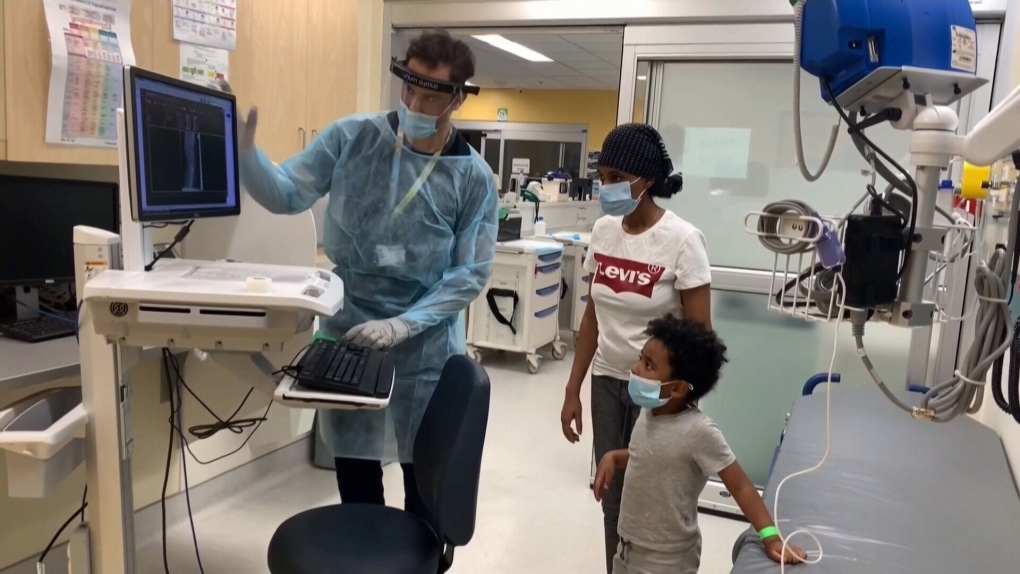Children's health is 'neglected,' say Quebec's top pediatricians calling for nationwide action plan
 Canada's leading pediatric health organizations are calling on provinces to collaborate on a national children's health strategy.
Canada's leading pediatric health organizations are calling on provinces to collaborate on a national children's health strategy.
Leading children's health organizations across Canada are calling on the federal and provincial governments to work together to address what they are calling a longstanding crisis.
In a joint statement Children's Healthcare Canada, the Canadian Association of Pediatric Nurses and the Canadian Pediatric Society urged provincial governments to call a first minister's meeting to collaborate on a "restabilizing" plan.
The call to action by the three organizations followed an editorial, sent to CTV News, authored by the Quebec Pediatric Chairs that blamed the situation on "a confluence of factors."
"Some related to neglect of the needs of children, and some related to deliberate decisions to divert health-care resources away from children," the editorial states.
Canada's ranking on the latest Unicef Report Card on child and youth well-being stands at 30 out of 38 countries.
The emphasis now, the group said, needs to be not just on the present-day problems playing out in overcrowded pediatric emergency rooms across the country but also on permanent solutions, since the issues pre-date the pandemic by decades and negatively affect the course of children's lives.
"There's such a lack in the network of beds and pediatricians and health care providers outside the university hospitals," said Dr. Anne Monique Nuyt, chief of pediatrics at Ste-Justine Hospital.
"That's one thing that's been made fragile throughout the pandemic and over the years, " she said, adding that even hospitals are short of professionals - nurses, respiratory therapists and nutritionists, for example.
"It really requires specialized special skills to take care of [children]...it's a special job and I think our children deserve that we care for them. They're our future," said Nuyt.
And assessments and treatments have to be timely, said Nuyt's counterpart at the Montreal Children's Hospital.
"Childhood is a critical window in everybody's life. It's a critical time of development and anytime we're delaying essential healthcare services it has the potential to have a lifelong impact," said Dr. Bethany Foster.
LACK OF ACCESS TO FAMILY DOCTORS
The shortage of family doctors in certain parts of the province, notably in Montreal, has a greater impact on children who are 0-5 years than people who are older than 15, Nuyt explained.
"These are critical years for growth development milestones," she said noting that the Quebec health ministry's recent plan to shift the care of healthy children to GPs from pediatricians will work if they get the regular check-ups they need.
"For someone to know if a child's health is normal, you need to see them, and on a regular basis to make sure they stay normal. That's kind of obvious," the pediatrician said.
Access to primary care is among the most basic priorities listed by the pediatric organizations. The other priorities include:
- develop a human resources strategy with a focus on specialized skills and experience required to care for children and youth
- build a child and youth health data strategy
- increase home care and pediatric respite supports for children with complex medical conditions
- increase capacity for early intervention and community-based mental health services-establish a list of critical medications for children in Canada
CTVNews.ca Top Stories

Father and daughter found dead in northwest Calgary
Calgary police are investigating the death of a father and daughter on Sunday night as a double homicide and believe it's the result of a domestic incident.
Year in review: Notable people who died in 2024
Here is a roll call of some noteworthy figures who died in 2024.
Halifax airport runway reopens after plane caught fire upon landing
The plane that caught fire upon landing at Halifax's airport over the weekend has been removed, and the runway has reopened.
opinion Tom Mulcair: Grading Trudeau's performance in 2024, and what's ahead for him in the new year
Prime Minister Justin Trudeau is about to enter the final year of his mandate and, quite possibly, of his political career, writes Tom Mulcair in his column for CTVNews.ca. The former NDP leader takes a snapshot of Trudeau's leadership balance sheet as a way of understanding how he got to where he is in the polls.
Murder, she spoke: Violence and death getting mentioned more often in movie scripts, study finds
A new study shows that movies have more violence in them than ever -- or at least, movie characters are more interested in talking about it.
Appeals court upholds US$5 million award in sexual abuse verdict against Donald Trump
A federal appeals court on Monday upheld a jury’s finding in a civil case that Donald Trump sexually abused a columnist in an upscale department store dressing room in the mid-1990s.
Gal Gadot reveals she underwent emergency surgery for brain clot just after welcoming her 4th child
Gal Gadot is opening up about how she survived a "massive blood clot" in her brain during her most recent pregnancy.
S&P/TSX composite down more than 200 points, U.S. markets fall
Canada's main stock index was down more than 200 points in late-morning trading Monday, led by weakness in technology and base metals, while U.S. markets also fell, led by a 1.4 per cent loss on the Nasdaq.
Passengers describe travel nightmare after WestJet flight from Costa Rica cancelled
It was a travel nightmare that left more than 100 passengers, including Ottawa residents, stranded in Costa Rica this week.

































